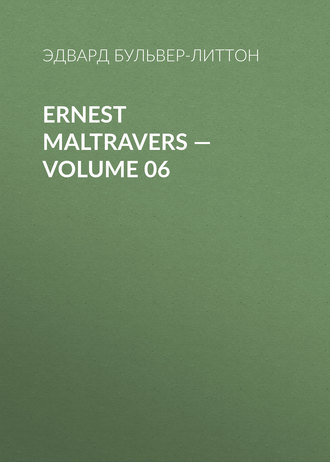
Эдвард Бульвер-Литтон
Ernest Maltravers — Volume 06
Maltravers paused at last, and threw himself on his sofa, wearied and exhausted. Involuntarily, and as a half unconscious means of escaping from his conflicting and profitless emotions, he turned to several letters, which had for hours lain unopened on his table. Every one, the seal of which he broke, seemed to mock his state—every one seemed to attest the felicity of his fortunes. Some bespoke the admiring sympathy of the highest and wisest—one offered him a brilliant opening into public life—another (it was from Cleveland) was fraught with all the proud and rapturous approbation of a prophet whose auguries are at last fulfilled. At that letter Maltravers sighed deeply, and paused before he turned to the others. The last he opened was in an unknown hand, nor was any name affixed to it. Like all writers of some note, Maltravers was in the habit of receiving anonymous letters of praise, censure, warning, and exhortation—especially from young ladies at boarding schools, and old ladies in the country; but there was that in the first sentences of the letter, which he now opened with a careless hand, that riveted his attention. It was a small and beautiful handwriting, yet the letters were more clear and bold than they usually are in feminine caligraphy.
"Ernest Maltravers," began this singular effusion, "have you weighed yourself? Are you aware of your capacities? Do you feel that for you there may be a more dazzling reputation that that which appears to content you? You who seem to penetrate into the subtlest windings of the human heart, and to have examined nature as through a glass—you, whose thoughts stand forth like armies marshalled in defence of truth, bold and dauntless, and without a stain upon their glittering armour;—are you, at your age, and with your advantages, to bury yourself amidst books and scrolls? Do you forget that action is the grand career for men who think as you do? Will this word-weighing and picture-writing—the cold eulogies of pedants—the listless praises of literary idlers, content all the yearnings of your ambition? You were not made solely for the closet; 'The Dreams of Pindus, and the Aonian Maids' cannot endure through the noon of manhood. You are too practical for the mere poet, and too poetical to sink into the dull tenor of a learned life. I have never seen you, yet I know you—I read your spirit in your page; that aspiration for something better and greater than the great and the good, which colours all your passionate revelations of yourself and others—cannot be satisfied merely by ideal images. You cannot be contented, as poets and historians mostly are, by becoming great only from delineating great men, or imagining great events, or describing a great era. Is it not worthier of you to be what you fancy or relate? Awake, Maltravers, awake! Look into your heart, and feel your proper destinies. And who am I that thus address you?—a woman whose soul is filled with you—a woman in whom your eloquence has awakened, amidst frivolous and vain circles, the sense of a new existence—a woman who would make you, yourself, the embodied ideal of your own thoughts and dreams, and who would ask from earth no other lot than that of following you on the road of fame with the eyes of her heart. Mistake me not; I repeat that I have never seen you, nor do I wish it; you might be other than I imagine, and I should lose an idol, and be left without a worship. I am a kind of visionary Rosicrucian: it is a spirit that I adore, and not a being like myself. You imagine, perhaps, that I have some purpose to serve in this—I have no object in administering to your vanity; and if I judge you rightly, this letter is one that might make you vain without a blush. Oh, the admiration that does not spring from holy and profound sources of emotion—how it saddens us or disgusts! I have had my share of vulgar homage, and it only makes me feel doubly alone. I am richer than you are—I have youth—I have what they call beauty. And neither riches, youth, nor beauty ever gave me the silent and deep happiness I experience when I think of you. This is a worship that might, I repeat, well make even you vain. Think of these words, I implore you. Be worthy, not of my thoughts, but of the shape in which they represent you: and every ray of glory that surrounds you will brighten my own way, and inspire me with a kindred emulation. Farewell.—I may write to you again, but you will never discover me; and in life I pray that we may never meet!"
CHAPTER V
"Our list of nobles next let Amri grace."
/Absalom and Achitophel.
"Sine me vacivum tempus ne quod dem mihi Laboris."3
—TER.
"I CAN'T think," said one of a group of young men, loitering by the steps of a clubhouse in St. James's Street—"I can't think what has chanced to Maltravers. Do you observe (as he walks—there—the other side of the way) how much he is altered? He stoops like an old man, and hardly ever lifts his eyes from the ground. He certainly seems sick and sad."
"Writing books, I suppose."
"Or privately married."
"Or growing too rich—rich men are always unhappy beings."
"Ha, Ferrers, how are you?"
"So-so. What's the news?" replied Lumley.
"Rattler pays forfeit."
"O! but in politics?"
"Hang politics—are you turned politician?"
"At my age, what else is there left to do?"
"I thought so, by your hat; all politicians sport odd-looking hats: it is very remarkable, but that is the great symptom of the disease."
"My hat!—/is/ it odd?" said Ferrers, taking off the commodity in question, and seriously regarding it.
"Why, who ever saw such a brim?"
"Glad you think so."
"Why, Ferrers?"
"Because it is a prudent policy in this country to surrender something trifling up to ridicule. If people can abuse your hat or your carriage, or the shape of your nose, or a wart on your chin, they let slip a thousand more important matters. 'Tis the wisdom of the camel-driver, who gives up his gown for the camel to trample on, that he may escape himself."
"How droll you are, Ferrers! Well, I shall turn in, and read the papers; and you—"
"Shall pay my visits and rejoice in my hat."
"Good day to you; by the by, your friend, Maltravers, has just passed, looking thoughtful, and talking to himself. What's the matter with him?"
"Lamenting, perhaps, that he, too, does not wear an odd hat for gentlemen like you to laugh at, and leave the rest of him in peace. Good day."
On went Ferrers, and soon found himself in the Mall of the Park. Here he was joined by Mr. Templeton.
"Well, Lumley," said the latter (and it may be here remarked that Mr.
Templeton now exhibited towards his nephew a greater respect of manner and tone than he had thought it necessary to observe before)—"well, Lumley, and have you seen Lord Saxingham?"
"I have, sir; and I regret to say—"
"I thought so—I thought it," interrupted Templeton: "no gratitude in public men—no wish, in high place, to honour virtue!"
"Pardon me; Lord Saxingham declares that he should be delighted to forward your views—that no man more deserves a peerage; but that—"
"Oh, yes; always /buts/!"
"But that there are so many claimants at present whom it is impossible to satisfy; and—and—but I feel I ought not to go on."
"Proceed, sir, I beg."
"Why, then, Lord Saxingham is (I must be frank) a man who has a great regard for his own family. Your marriage (a source, my dear uncle, of the greatest gratification to /me/) cuts off the probable chance of your fortune and title, if you acquire the latter, descending to—"
"Yourself!" put in Templeton, drily. "Your relation seems, for the first time, to have discovered how dear your interests are to him."
"For me, individually, sir, my relation does not care a rush—but he cares a great deal for any member of his house being rich and in high station. It increases the range and credit of his connections; and Lord Saxingham is a man whom connections help to keep great. To be plain with you, he will not stir in this business, because he does not see how his kinsman is to be benefited, or his house strengthened."
"Public virtue!" exclaimed Templeton.
"Virtue, my dear uncle, is a female: as long as she is private property, she is excellent; but public virtue, like any other public lady, is a common prostitute."
"Pshaw!" grunted Templeton, who was too much out of humour to read his nephew the lecture he might otherwise have done upon the impropriety of his simile; for Mr. Templeton was one of those men who hold it vicious to talk of vice as existing in the world; he was very much shocked to hear anything called by its proper name.
"Has not Mrs. Templeton some connections that may be useful to you?"
"No, sir!" cried the uncle, in a voice of thunder.
"Sorry to hear it—but we cannot expect all things: you have married for love—you have a happy home, a charming wife—this is better than a title and a fine lady."
"Mr. Lumley Ferrers, you may spare me your consolations. My wife—"
"Loves you dearly, I dare say," said the imperturbable nephew. "She has so much sentiment, is so fond of poetry. Oh, yes, she must love one who has done so much for her."
"Done so much; what do you mean?"
"Why, with your fortune—your station—your just ambition—you, who might have married any one; nay, by remaining unmarried, have conciliated all my interested, selfish relations—hang them—you have married a lady without connections—and what more could you do for her?"
"Pooh, pooh; you don't know all."
Here Templeton stopped short, as if about to say too much, and frowned; then, after a pause, he resumed, "Lumley, I have married, it is true. You may not be my heir, but I will make it up to you—that is, if you deserve my affection."
"My dear unc—"
"Don't interrupt me, I have projects for you. Let our interests be the same. The title may yet descend to you. I may have no male offspring—meanwhile, draw on me to any reasonable amount—young men have expenses—but be prudent, and if you want to get on in the world, never let the world detect you in a scrape. There, leave me now."
"My best, my heartfelt thanks!"
"Hush—sound Lord Saxingham again; I must and will have this bauble—I have set my heart on it." So saying, Templeton waved away his nephew, and musingly pursued his path towards Hyde Park Corner, where his carriage awaited him. As soon as he entered his demesnes, he saw his wife's daughter running across the lawn to greet him. His heart softened; he checked the carriage and descended: he caressed her, he played with her, he laughed as she laughed. No parent could be more fond.
"Lumley Ferrers has talent to do me honour," said he, anxiously, "but his principles seem unstable. However, surely that open manner is the sign of a good heart."
Meanwhile, Ferrers, in high spirits, took his way to Ernest's house. His friend was not at home, but Ferrers never wanted a host's presence in order to be at home himself. Books were round him in abundance, but Ferrers was not one of those who read for amusement. He threw himself into an easy-chair, and began weaving new meshes of ambition and intrigue. At length the door opened, and Maltravers entered.
"Why, Ernest, how ill you are looking!"
"I have not been well, but I am now recovering. As physicians recommend change of air to ordinary patients—so I am about to try change of habit. Active I must be—action is the condition of my being; but I must have done with books from the present. You see me in a new character."
"How?"
"That of a public man—I have entered parliament."
"You astonish me!—I have read the papers this morning. I see not even a vacancy, much less an election."
"It is all managed by the lawyer and the banker. In other words, my seat is a close borough."
"No bore of constituents. I congratulate you, and envy. I wish I were in parliament myself."
"You! I never fancied you bitten by the political mania."
"Political!—no. But it is the most respectable way, with luck, of living on the public. Better than swindling."
"A candid way of viewing the question. But I thought at one time you were half a Benthamite, and that your motto was, 'The greatest happiness of the greatest number.'"
"The greatest number to me is number /one/. I agree with the Pythagoreans—unity is the perfect principle of creation! Seriously, how can you mistake the principles of opinion for the principles of conduct? I am a Benthamite, a benevolist, as a logician—but the moment I leave the closet for the world, I lay aside speculation for others, and act for myself."
"You are, at least, more frank than prudent in these confessions."
"There you are wrong. It is by affecting to be worse than we are that we become popular—and we get credit for being both honest and practical fellows. My uncle's mistake is to be a hypocrite in words: it rarely answers. Be frank in words, and nobody will suspect hypocrisy in your designs."







